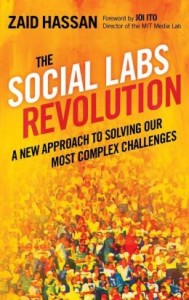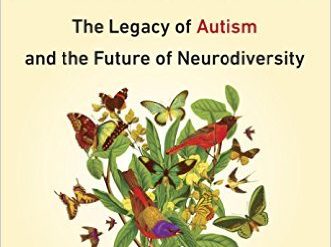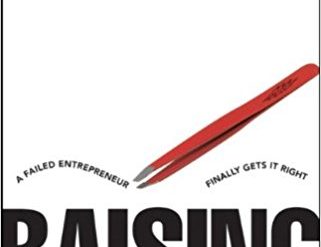
Planning based-approaches — so common across government, civil society, and even business — represent a neo-Soviet paradigm” and have long been shown to be at best minimally effective in fostering meaningful social change.
If that assertion is a revelation to you, you’re sure to find The Social Labs Revolution illuminating. No matter how familiar you may be with economic development, urban planning, or other fields in which disciplined planning is a fixture, you’re likely to discover something new in this challenging book.
Explaining what makes social change happen.
The author, Zaid Hassan, has built a consulting business on the basis of his belief that, instead of “strategic planning” by “experts,” the world’s most urgent and compelling problems can be solved only by bringing together large, diverse teams representing every aspect of the population that is most directly affected. Working together over months or years as a “social lab,” a team consisting of as many as 36 people struggles together but, eventually, and after considerable conflict and unhappiness, will arrive at a set of practical approaches to prototype as the first stage in solving the problem they share. At its core, a social lab is characterized in three ways: it’s social, it’s experimental, and it’s systemic (in that the ideas that emerge “aspire to be systemic in nature.”). Work within the lab is based on the “U Process” championed by Otto Scharmer.
The Social Labs Revolution: A New Approach to Solving Our Most Complex Challenges by Zaid Hassan ★★★★☆
The problems Hassan and his colleagues choose to address are invariably deep-seated and often life-threatening. The Social Labs Revolution focuses on three long-running experiments, one on sustainable food, a second on malnutrition in urban children (specifically, those living in Maharashtra state in India), and the third on stabilizing the (notoriously unstable) nation of Yemen. For example, the first of these three, a Sustainable Food Lab, was global in scope and participation, bringing together participants from government (Brazil, The Netherlands), civil society (World Wildlife Fund, The Nature Conservancy), and corporate food companies (Unilever, General Mills) who worked together for two years. The author credits the team with putting “sustainability” on the radar screens of global food companies.
Others advance the social lab technology, too
As Hassan concedes, his consultancy, Reos Partners, is not alone in advancing the social lab technology. He also mentions a Chilean innovation, SociaLab, which addresses new enterprises to alleviate poverty, and the Abdul Latif Jameel Poverty Action Lab at MIT, and points to a number of similar though less structured examples such as Greenpeace’s Mobilisation Lab, set in motion “‘to break through and win on threats to people and the planet.'”
The Social Labs Revolution is blissfully short and easy to digest, with the exception of an annoying digression into an academic discussion of the philosophy underlying the social labs concept. I don’t know about you, but whenever I come across repeated references (13 of them) to the philosopher Martin Heidegger and his disciples, or any other recognizable name from the ranks of dead white philosophers, I head for the exits. Instead of that digression, I would have enjoyed a more detailed discussion of the results that emerged from the three social labs mentioned most prominently in the book. What Hassan offers is spotty and inadequate.
Nitpicking: Someone — the author, the editor, or the proofreader, I know not who, or what potential combination of them — seems to believe that Jack Welch was “the legendary CEO of General Motors.” Fact-checker, please!
For further reading
This is one of the books I’ve included in my post, Gaining a global perspective on the world around us.
Like to read books about politics and current affairs? Check out Top 10 nonfiction books about politics.
If you enjoy reading nonfiction in general, you might also enjoy:
- Science explained in 10 excellent popular books
- Great biographies I’ve reviewed: my 10 favorites
- Top 10 nonfiction books about politics
And you can always find my most popular reviews, and the most recent ones, plus a guide to this whole site, on the Home Page.


























